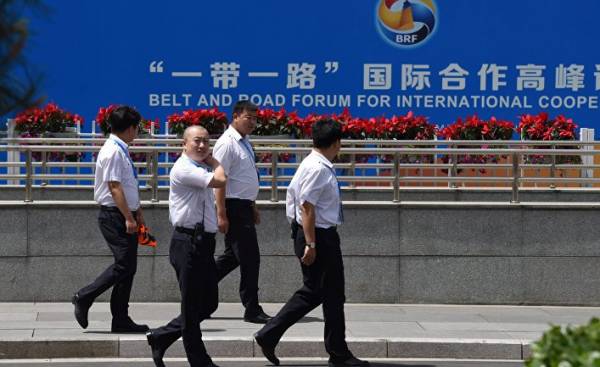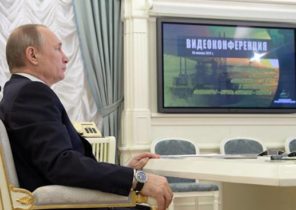
Beijing — Sunday, may 14, at the large-scale international forum in Beijing China’s leaders presented a concept for what they hope will be a new world order.
Forum on “One belt and one road” is the response of China at Davos, or the summit of the Big twenty. This forum is dedicated to the initiative “One belt and one road”, which draws on the image of the ancient silk road trade.
Speaking at the opening ceremony of the forum, China’s leader XI Jinping (Xi Jinping) said that this initiative is international in nature, refuting the claims of critics that this project will dominate China.
“We hope to create a large family whose members will live in harmony with each other,” said si, adding that any country can take part in this project.
XI also announced that China will contribute an additional of $ 14.5 billion in silk road Fund, which supports projects in the framework of this initiative, and will provide 8.7 billion dollars to help developing countries.
After si took the floor the President of Russia Vladimir Putin, who, apparently, decided to make a criticism of the USA not taking part in this initiative.
“Protectionism becomes the norm,” Putin warned, adding that “the ideas of openness, freedom of trade is now increasingly rejected, and often those who most recently served as their advocate”.
In the initiative of “One belt and one road”, which has been developing for four years, attended by 68 countries, and it covers 40% of global GDP. China is trying to nominate her for the position of world leadership because the US under President Donald trump lean towards more protectionist approach, taking the mantle of globalization.
The Sunday forum is held near the Beijing Olympic Park, which hosted the Olympic games of 2008, because the city now the weather’s wonderful that Chinese leaders have learned to create, when required by political events. The roads around this place were closed, and special forces have taken all possible measures to ensure the safety of guests.
Political pressure
On Sunday the forum was attended by the leader of China, XI Jinping, who became the initiator of the project “One belt and one road”, the President of Russia Vladimir Putin, President Recep Tayyip Erdogan, President of the Philippines Rodrigo Duterte, as well as leaders and senior officials of several other countries.
They were joined by a small delegation from North Korea despite rising tensions between Beijing and Pyongyang over the nuclear program of the latter.
On Sunday morning, 14 may, North Korea tested a ballistic missile, demonstrating how high is the tension in the region at the moment and trying to distract attention from the forum of “One belt and one road” that can be seen as a deliberate insult to the si.
The leaders of the US and European countries did not attend the forum. Although Washington sent to the forum in Beijing, special assistant to the President of the United States Matt Pottinger (Matt Pottinger), elected officials, and government Ministers in Beijing has not arrived.
In its communiqué, which reported on a new trade deal with China which was published on Thursday, may 11, the U.S. emphasized that they “recognize the significance of the Chinese initiative “One belt and one road”, but Washington is not actively involved in this initiative and related projects, such as the Asian infrastructure investment Bank led by China.
In an interview with CNN on Saturday, may 13, the President of the Bank Liqun Jin (Jin Liqun) said that the United States can still participate in the projects of China, noting that “regardless of membership of the United States… we can cooperate.”
“The door is open, we would welcome any members,” he added.
Although in China the initiative “One belt and one road” is positioned as a project that can benefit the world and help millions of people out of poverty, in other countries, the perception of this project can be called mixed.
Last week, Joerg Wuttke (Jörg Wuttke), the outgoing Chairman of the chamber of Commerce of the European Union to China, warned that this initiative is increasingly used by Chinese companies who are trying to avoid scrutiny over the movement of capital, diverting money out of the country under the pretext of international investments and partnerships”.
Along with other critics, he pointed out the limitations and obstacles faced by foreign companies operating in China, calling them evidence of the hypocrisy of Beijing behind the initiative “One belt and one road”.
Even India is skeptical about this initiative. In may the Minister of Finance and defence Arun Jaitly India (Arun Jaitley) told reporters that new Delhi is experiencing “serious doubts” on this project, especially regarding China-funded construction in Pakistani Kashmir.
The US retreat
Although many countries may have agreed to participate in the initiative “One belt and one road”, guided by “a more optimistic view on the intentions of China,” gradually their illusions dissipate, said Christopher balding (Balding, Christopher), Professor of Economics at Peking University.
Especially all interested in the question of what would happen if a Chinese-financed projects will fail. According to balding, in the past, this meant that the Chinese firms and banks “in essence took the lead” that gave them the ability to control vital strategic projects in foreign countries”. Some experts also warned that some projects may be prohibitively expensive and do not bring almost no benefits to their supporters and local residents.
Jin noted that such warnings are “necessary”, adding that in the past really “was overly expensive and unnecessary projects, there were mistakes”.
“It is critical that resources invested in projects [in the framework of the initiative “One belt and one road”], to bring people tangible results” in those countries where they are implemented, said Jin in an interview with CNN.
Max Bocas (Max Baucus,), former U.S. Ambassador to China, noted that this initiative “, if not scared, then at least have alarmed many countries.”
To elect Donald trump President of the United States was to be expected that the TRANS-Pacific partnership Washington — a trade Alliance of 12 countries in the Asian and Pacific countries — could become a kind of counterweight to the growing power of China.
However, trump led the United States out of the Alliance on the day after the inauguration of the President. Though the Alliance still includes Australia and Japan, without the support of Washington, this partnership will play a much less significant role, even if it still exists.
The United States also reduced the extent of its activity in the disputed waters of the South China sea within the framework of what many consider another concession to Beijing from the new U.S. President, who hopes to find a solution to the situation with North Korea.
According to David, the US withdrawal from the region will trigger the vacuum.
“[The TRANS-Pacific partnership] was an economic addition to the military plans in the South China sea,” he said, adding that the initiative “One belt and one road” makes China the leader.







